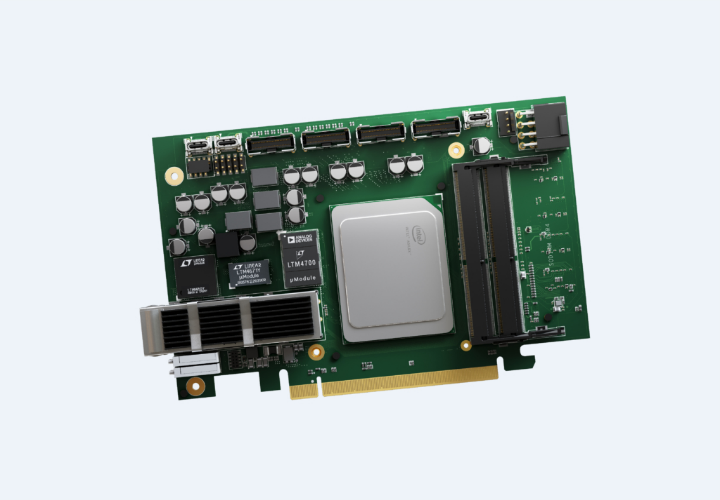Prague, February 3rd, 2022. In cooperation with the French company Reflex CES, the CESNET association created one of the first 400Gb FPGA accelerator cards. The new card is primarily designed for accurate network monitoring and network infrastructure security applications.
Thanks to the new generation of PCI Express, the card allows you to transfer the full capacity of the line to the host computer’s memory, thus easily dividing monitoring and security functions between hardware and software. There are currently no commercially available servers that support the latest PCI 5.0 standard. However, the design of the new card remembers this fact as well. The card is equipped with an expansion connector that allows data to be transmitted in parallel over two PCIe slots, and thus achieve the required 400Gb speed even when using slightly more available PCIe 4.0 buses.
“It’s one of the most complex cards I’ve designed,” says Jiří Sikora, the card’s chief hardware designer, who has worked for the multinational Flex Ltd. in addition to CESNET.
The design of the monitoring card is based on CESNET’s many years of experience in the field of hardware acceleration and fast processing of network traffic. Already in 2015, a research team from the CESNET association and Netcope Technologies created one of the first 100Gb accelerator cards, which won the Czech Head award in the Industry category a year later. Further research of the association focused on the flexibility of programming accelerator cards using the P4 language and on increasing the speed of network data processing to 400Gb/s.
“Processing network data at 400 Gb/s brings some challenges. Due to the high data rate, up to four packets can arrive simultaneously during a clock cycle. To process data at such high speeds, it was necessary to devise an efficient parallel processing method, which on the one hand allows to reach the required speed of 400 Gb/s and on the other hand effectively works with available hardware resources in FPGA technology, “says Jakub Cabal, Head of Development of FPGA IP cores.
As part of a research project of the Ministry of the Interior called FOKUS, but also thanks to several other research projects, the CESNET association managed to create a basic set of acceleration cores operating at 400Gb/s.
“Using the new card and accelerator cores, we will be able to create new monitoring and security tools operating at 400 Gb/s,” adds Jan Kořenek, Head of the Research Department ensuring the development of monitoring and security tools at CESNET.
Reflex CES plans to further offer the 400GE card to its customers with the support of FPGA design by BrnoLogic, spol. s r. o. CESNET associations will incur license fees from the sale of each card sold. The cooperation between CESNET and Reflex CES does not end with the development of the 400GE card. Thanks to well-established cooperation and the experience of hardware designers of the CESNET association, both organizations are already planning cooperation in the development of other products.
Technical details
The new 400Gb FPGA accelerator card features a single 400Gb Ethernet interface, a Quad-core 64bit ARM Cortex-A53 processor with DDR4 memory and a pair of fast dynamic DDR4 memory slots with a capacity of up to 2 x 32 GB and a PCIe 5.0 interface. The creation of the card was supported by Intel with the first samples of new Agilex I-Series FPGA SoC chips, which not only support the 400Gb Ethernet interface, but also enable connection to the 5th generation PCI Express bus (PCIe 5.0).

400GE card with Intel® Agilex™ I-Series FPGA technology

This project (FOKUS – Adaptive control of data collection and analysis in high-speed networks, VI20172020064) was supported by the Ministry of the Interior of the Czech Republic, with headquarters at Nad Štolou 936/3, 170 34 Prague 7, from the Security Research Program of the Czech Republic in 2015 2020 (BV III/1 – VS).
CESNET was founded in 1996 by universities and the Czech Academy of Sciences. It is engaged in research and development of information and communication technologies, building and developing a national CESNET e-infrastructure for research and education. Thanks to its research activities and achievements, it represents the Czech Republic in important international projects, especially in building the pan-European network GÉANT or grid projects (EGI.eu), and participates actively in their implementation. The association is also working on the use of high-speed networks for sharing multimedia data, both synchronously in the form of video conferencing and shared applications, and asynchronously in the form of streaming. Since December 2020, CESNET represents the Czech Republic in the international association dealing with the open science paradigm – EOSC AISBL.Více na: www.cesnet.cz
